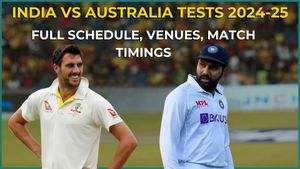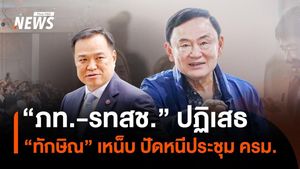Germany's political climate is undergoing serious scrutiny as public trust inches toward historic lows, particularly following the challenges faced by the Ampel-Koalition. This pressing topic was at the forefront of Caren Miosga's ARD Talk Show, where political leaders and journalists gathered just before Chancellor Olaf Scholz's impending vote of confidence.
Miosga, known for her incisive interviews, hosted Ricarda Lang, the former leader of the Greens, and Peer Steinbrück, once the SPD's chancellor candidate. The show was broadcast live, drawing attention to the glaring disconnect between politicians and the public, especially amid the government's current crises.
A recent study conducted by the Körber-Stiftung only adds weight to the urgent nature of this discussion; it reported a shocking trust deficit with merely 22% of participants expressing confidence in the Bundestag and only 9% trusting the political parties. Lang candidly admitted to Miosga, “Wir haben einen großen Fehler gemacht in Sachen AfD,” or “We made a big mistake concerning the AfD.” She reflected on how the Greens had focused excessively on arguing against the far-right party instead of addressing pressing issues such as infrastructure and education. This kind of self-reflection marks her time on the show as both self-critical and proactive.
Steinbrück also weighed in, diagnosing what he termed as 'a transparency problem' within politics. He stated, “Politiker müssen genauer erklären, dass schwierige Zeiten auf uns zukommen,” emphasizing the need for politicians to provide clear communication about the difficulties the nation is facing. He referenced the widespread mistrust, which he believes stems largely from politicians' failure to face challenges head-on, out of fear of backlash.
Through the evening's discussions, various issues oscillated from the failures of the Ampel-Koalition to societal issues such as the economy and potential reforms needed going forward. Miosga allowed her guests the space to critique not just each other but their own parties. Lang suggested the government needed to do more than simply proclaim new directions. She stated, “Wir müssen anfangen, die Menschen wieder wie Erwachsene zu behandeln,” or “We need to start treating people like adults again.” Her sentiment echoed the frustrations felt by many citizens—suggesting they were tired of being spoken to paternalistically.
The backdrop of the discussion was heavy with events from the past years, including the ramifications of Russia's invasion of Ukraine and how these crises impacted domestic policy and public perception. Steinbrück noted, "Das Ding ist nur, man hat keine vier normalen Jahre gehabt,” explaining how the coalition's initial harmony was shattered by unexpected global events.
Critically, there was also conversation about the political culture itself, which Steinbrück described as having “beschreibungsangst,” or fear of description—indicating politicians' reluctance to speak plainly about unpleasant truths. This accusation was equally targeted at the media's role, pointed out by Lang, who remarked on how narratives often reduced complex problems to winners and losers, sidelining real issues.
The Union’s handling of economic challenges came under fire as well, with Lang calling it “Wählerverarsche,” or voter deception, claiming their lack of transparent budgeting would result in severe consequences for everyday citizens. She went on to criticize them for dishing out tax cuts to the wealthy without any supporting financing plan. This moment exemplified the high-stakes nature of public discourse, where rhetoric can shape—or distort—public perception.
Although the atmosphere was charged, moments of levity did emerge. The panel often humorously acknowledged the absurdities of modern political discussions, which have devolved not only to temporal issues like election timing but to personality contests among leaders. This point was articulated by Alexander, who noted how the focus has shifted from genuine political challenges to trivialities.
Yet, the laughter was underpinned by genuine concern for the future, as all guests recognized the urgency required to address the widening mistrust. Steinbrück warned, “Wenn eine neue Regierung nicht in der Lage ist, dieses Vertrauen wieder zu heben, dann fürchte ich, dass die übernächsten Bundestagswahlen ... zu einer Nagelprobe auf unseren Parlamentarismus werden könnten.” He articulated fears about the next federal elections potentially serving as a dire referendum on the status of democracy itself.
The show wrapped up with Miosga reflecting on the insights shared, leaving viewers with the pressing question: How will Germany's political leadership navigate the stormy waters of discontent to re-establish trust? With the looming instability of the Ampel-Koalition and the uncertain future for German democracy, the nation watches closely.
After the show, it’s clear: the dialogue initiated by Miosga has stirred the necessary debate about trust, accountability, and the direction of the country. The challenge now lies not only with the politicians but with citizens who must engage meaningfully with their elected officials, advocating for the type of governance they want to see.



